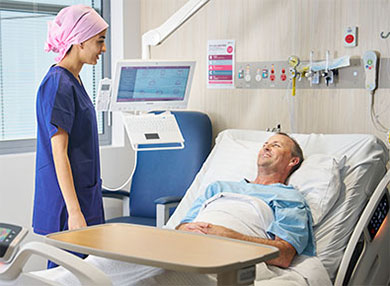Providing world-class orthopaedic services
Macquarie University Hospital offers the full range of well-established and routine orthopaedic procedures.
As a university hospital with several strong research programs and multidisciplinary collaborations, we are able to deliver innovative solutions for patients. The hospital is also unique in being able to treat complex conditions often unable to be treated elsewhere.
Hip and knee surgery
 Many of our orthopaedic surgeons specialise in hip and knee joint replacement (full and total), fracture management and joint preservation options. Find out more about our No-Gap Joint Replacement Program.
Many of our orthopaedic surgeons specialise in hip and knee joint replacement (full and total), fracture management and joint preservation options. Find out more about our No-Gap Joint Replacement Program.
Other treatments include patellofemoral mechanics along with ligament reconstruction, arthritis management and kinematic knee replacement.
Arthroscopic meniscal repair, tibial osteotomy, ACL repair and revision arthroplasty are all available to patients choosing Macquarie University Hospital. In some cases, surgeons can offer patients 3D custom-printed joints uniquely drafted to a patient’s own anatomy.
Orthopaedics at Macquarie University Health
Our surgeons are able to address the full range of hand and wrist trauma and joint conditions. They can attend to sports and work injuries, complex trauma and paediatric conditions – as well as the osteoarthritic ‘wear and tear’ that comes with ageing.
Patients present with complex or simple wrist and finger fractures, tendon and other soft tissue disorders – such as carpal tunnel syndrome, Dupuytren’s contracture and De Quervain’s tenosynovitis – and nerve compression disorders. Hand malformations, neonatal brachial plexus palsy and a variety of children’s hand disorders are also some of many conditions that our team can treat.
Reconstruction following hand trauma, finger joint replacements, microsurgery and minimally invasive surgery, such as endoscopic carpal tunnel decompression and wrist arthroscopy, are all available.
Ankle arthroscopy is offered for a wide range of conditions, including arthritis, unstable ankle, fractures, ligament repair and other ailments. Minimally invasive approaches for bunion and forefoot reconstruction, including complex bony and soft tissue deformity correction are also available.
Macquarie University Hospital surgeons have expertise in advanced total ankle replacement – including the treatment of ankle arthritis. Patient Specific Instrumentation (PSI) – technology that is well-established in hip and knee replacement is used for ankle replacement to increase the accuracy and provide patients with the aim of better long-term results and a lower revision rate.
Our surgeons are skilled in deformity correction, such as post-traumatic congenital or developmental problems such as bone infection, non-union, malunion, limb length discrepancy and malalignment.
The MQ Health Shoulder and Elbow Clinic is a world-class centre of excellence in the diagnosis and treatment of simple and complex shoulder and elbow problems. Our specialists have undergone extensive post-fellowship superspecialisation in world renowned centres of excellence in shoulder and elbow surgery.
They are outstanding communicators with a world-wide reputation in shoulder and elbow surgery and related research. They are trained to provide the highest standard of evidence-based treatment of shoulder and elbow problems in a multidisciplinary team environment with compassion and empathy. Such world-class training allows them to offer patients contemporary knowledge and technical expertise of the highest standard with a patient centred approach. They specialise in both open and arthroscopic (keyhole) shoulder and elbow reconstruction and joint replacement surgery.
The MQ Health Translational Shoulder Research program has gained world-wide recognition for its cutting-edge research in numerous arms of translational research including, biomechanics, prosthesis design, advanced radiological imaging, novel shoulder rehabilitation and a variety of emerging treatments, such as novel molecular therapies for some shoulder conditions. It has attracted nearly two million dollars in research grants.
Our specialist orthopaedic spine surgeons have extensive experience in the diagnosis and treatment of paediatric and adult spinal diseases and conditions such spine deformity, complex cervical reconstructions, spinal osteotomies and degenerative cervical and lumbar conditions.
The orthopaedic spinal procedures conducted at Macquarie University Hospital include:
- Anterior cervical discectomy and fusion
- Artificial cervical disc replacement
- Laminectomy (cervical) with fusion
- Lumbar disc microsurgery
- Laminectomy
- Endoscopic spine surgery
- Scoliosis correction
- Spinal fusion
- Spine osteotomy
- Spinal realignment
- Transforaminal lumbar interbody fusion
- Anterior lumbar interbody fusion.
Our multidisciplinary team includes highly skilled orthopaedic surgeons, physiotherapists, psychologists, pain specialists, plastic surgeons, nurses, prosthetists and general physicians. The team are experts in:
- Osseointegration surgery including treatment of amputees and performing robotic work on amputees to restore mobility.
- Complex orthopaedic pathologies such as severe deformities (post-traumatic and genetic), polio (usually in adults who have migrated to Australia), severe musculoskeletal disorders and limb abnormalities.
- Failed joint replacements including infected arthroplasties, failed prosthetics and revision of failed joint replacements.
- Limb lengthening which is treating limbs that have been shortened due to congenital deficiency, excision of cancer or by severe trauma using minimally invasive techniques.
Our multidisciplinary team includes highly skilled orthopaedic surgeons, physiotherapists, psychologists, pain specialists, plastic surgeons, nurses, prosthetists and general physicians. The team are experts in:
- Osseointegration surgery including treatment of amputees and performing robotic work on amputees to restore mobility.
- Complex orthopaedic pathologies such as severe deformities (post-traumatic and genetic), polio (usually in adults who have migrated to Australia), severe musculoskeletal disorders and limb abnormalities.
- Failed joint replacements including infected arthroplasties, failed prosthetics and revision of failed joint replacements.
- Limb lengthening which is treating limbs that have been shortened due to congenital deficiency, excision of cancer or by severe trauma using minimally invasive techniques.
